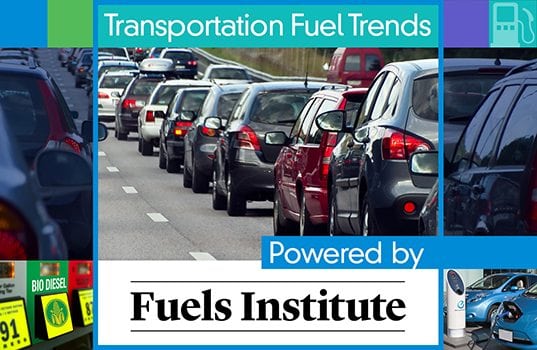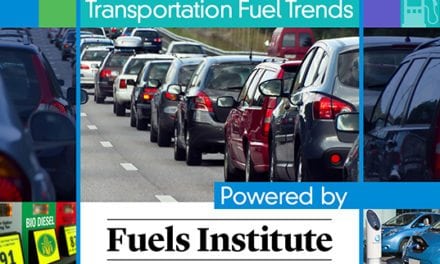[Editorial Note: This article ran previously in the May issue of NACS Magazine]
By John Eichberger
- What will it take for hydrogen fuel cell vehicles to gain market share?
- At what price point will drivers of flex fuel vehicles purchase E85?
- What will drive vehicle and fuel purchasing decisions of tomorrow’s consumers?
- How are retailers introducing natural gas to their customers?
These are some of many questions explored last month during the 2014 Spring Meeting of the Fuels Institute. This meeting was the second time Fuels Institute participants gathered in person to discuss crucial issues facing the fuels market. The two-day meeting was marked by an extremely high level of engagement and an exchange of perspectives by those committed to a collaborative approach for evaluating challenges and opportunities in the marketplace.
Hydrogen, E85 and Natural Gas
The Spring Meeting began with a robust discussion about the development of a hydrogen transportation fuels market to power fuel cell electric vehicles. Joe Gagliano, infrastructure specialist at the California Fuel Cell Partnership, detailed the effort involved in his state to bring this new technology to market, noting the various types of hydrogen retail delivery systems available and the timeline for vehicle introductions.
Attendees probed for information about the cost of hydrogen-powered vehicles, cost and characteristics of refueling systems, the overall environmental implications and the unexpected challenges that arise from the introduction of a new technology. What we learned: It currently costs around $2 million to install a retail facility, hydrogen fuel is selling for about $12 to $15 per kilogram (likely dropping $10 as the technology is introduced more broadly) and a vehicle refuel will take about five minutes, deliver 5 to 6 kilograms of hydrogen and deliver a range of 300 to 400 miles. The Fuels Institute hopes to deepen our understanding of this alternative fuel with visits to hydrogen refueling sites during the Fuels Institute Annual Meeting this November in Southern California.
Following the dialogue on hydrogen, Professor Bruce Babcock of Iowa State University discussed his team’s evaluation of the potential for E85 to assist with compliance of the Renewable Fuel Standard. Leveraging knowledge of consumer behavior in the ethanol-heavy Brazilian market, he created a model that projects potential U.S. demand for E85 under certain economic conditions. His work suggests that by optimizing the location of E85 stations and pricing E85 at a certain discount relative to E10, it might be possible to significantly increase the volume of ethanol sold as E85. The exact value of the necessary discount needs to be evaluated more closely in domestic markets.
At the meeting, Joel Hirshboeck of Kwik Trip shared his company’s experience converting their vehicles to natural gas and installing a refueling infrastructure. Kwik Trip currently operates 72 natural gas vehicles and have 25 natural gas retail stations in their system, with many more planned. In addition, Brett Barry with Clean Energy and Norman Herrera with Sparq Natural Gas shared their individual perspectives on the growth opportunities for natural gas, both in the heavy duty vehicle segment and within the consumer light duty market.
Field Trip
The Spring Meeting was also a great opportunity for attendees to expand their familiarity with certain alternative transportation technologies currently being researched at the National Renewable Energy Laboratory’s (NREL) campus in Golden, Colorado. The tour began with a visit to the electric vehicle grid integration laboratory to learn about EV recharging capabilities and emerging technologies. We then visited NREL’s biochemical and thermochemical cellulosic biofuels facilities, as well as the algae biofuels research laboratory.
All the presentations and the tour sparked robust discussion and will help drive the agenda of the Fuels Institute in coming months. Now in our second year, the Fuels Institute is delivering on its promise to foster a collaborative environment and to commission research that is relevant to both today’s market and the market of tomorrow.
A comprehensive analysis of the potential for a natural gas transportation market is currently underway by Carnegie Mellon University. The first report from this project will be released before year’s end. In addition, this summer we will evaluate the growth potential for the diesel market, exploring the increasing demand from light duty vehicles and the improved efficiency of the heavy duty fleet. In the coming months, the Fuels Institute will also be releasing a consumer survey gauging interest in alternative fuels and soliciting feedback and discussion.
Many exciting developments are percolating at the Fuels Institute that will inspire debate about the current and future market for transportation fuels. Keep your eyes open for new research, events and opportunities to help you extract the most from your fuels business.
 For more information about the Fuels Institute or how you can get involved, contact John Eichberger, executive director, at [email protected] or (703)518-7971.
For more information about the Fuels Institute or how you can get involved, contact John Eichberger, executive director, at [email protected] or (703)518-7971.
Join Us!
The Fuels Institute Annual Meeting is November 17-19, in Southern California. You are invited to register for this open meeting and we are planning a fantastic agenda. In addition to discussions on key issues facing the transportation fuels market, we will also be visiting retail facilities that dispense hydrogen and natural gas, as well as visit with experts at Toyota to learn more about advanced vehicle technologies. Registration information will be available in the near future. In the meantime, join the conversation online at Facebook and Twitter. By sharing information and opinions with one another, we can create a sustainable transportation fuels market.








